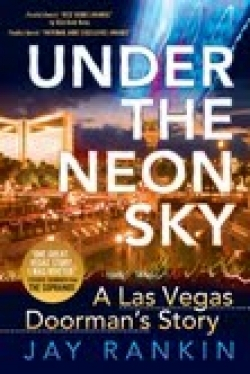Under the Neon Sky
A Las Vegas Doorman's Story
Whether one arrives at a Las Vegas resort in a taxicab, shuttle bus, Maserati, or stretch limo, a visitor is greeted by a doorman who radiates welcoming optimism. Gamblers, vacationers and business travelers emerging from the hotel, needing transportation, all manner of odd advice, a sympathetic ear or a slap on the back, meet that same doorman, who sees them off with congratulations, commiseration, or insider tips.
Jay Rankin chronicles several years working as a doorman ambassador on the coveted swing shift, where a good night means thousands in tips. Rankin witnesses more than he at first thought possible from a under the resort’s sweeping porte cochere, with its multiple traffic lanes, scurrying valets, jockeying cabs, bustling bellmen, and a cast of hookers, limo drivers, and a mean-spirited supervisor.
He’s charged with smoothly moving thousands of people (often in altered states) in and out of an establishment which exists solely to take their money. And, Rankin writes, that deceptively easy-looking job can suck the life out of anyone with a soul.
Initially excited at being part of the Vegas “electricity,” Rankin takes a job for which he’s clearly over-qualified, and once on duty, calls on his training as an advanced psychology student to observe the odd behavior around him. Soon he’s under his own microscope; while Rankin is busy stuffing cash and chips into the safari get-up he must don nightly, his wife finds other entertainment. On-the-job friendship turns duplicitous, management tries to maul his reputation, the lure of substance abuse is constant (he doesn’t always resist), a friend is murdered. The doorman once jazzed about playing a role in the city’s pulsing grid, skids towards brown-out.
Rankin’s language is often coarse and the tone gritty, mirroring the Vegas he comes to know. He’s a bit sketchy on chronology, women are portrayed as one-note, and he sometimes too strongly telegraphs future twists. Rankin can tell a story though, and he does, in all its human messiness, but woven with unexpected bursts of perceptive insight. He’s both resigned yet at times boyishly optimistic, and is in best form as psychology geek in observation mode, disguised as a doorman on duty.
Parts of the book seem unbelievable, befitting a modern workplace memoir, especially one playing out against the outsized expectations of Sin City. As his doorman days dwindle, what once sparkled and enticed is dimmed and dirtied. It’s enough to make anyone run for the door.
Reviewed by
Lisa Romeo
Disclosure: This article is not an endorsement, but a review. The publisher of this book provided free copies of the book and paid a small fee to have their book reviewed by a professional reviewer. Foreword Reviews and Clarion Reviews make no guarantee that the publisher will receive a positive review. Foreword Magazine, Inc. is disclosing this in accordance with the Federal Trade Commission’s 16 CFR, Part 255.

